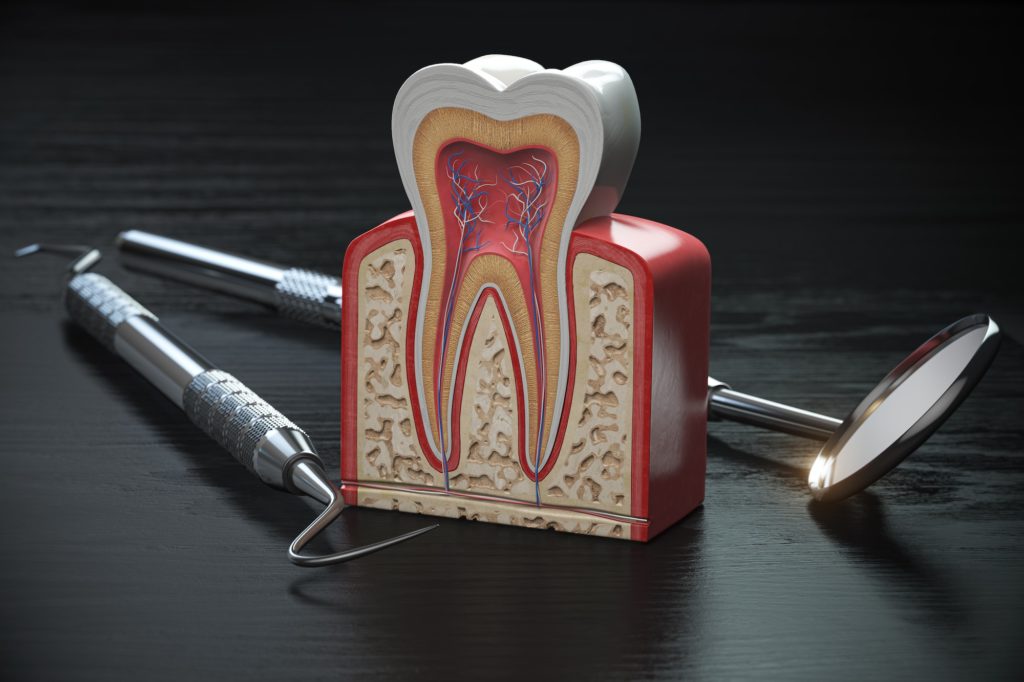What is an Endodontist?

Read this article to discover what an endodontist is and how they are different from a dentist, including education, professional areas of focus, and when you need to see an endodontist.
Table of Contents
What is an Endodontist and How Are They Different From a Dentist?
Endodontists are still dentists but specialize in tooth pain. They have extra knowledge and training, which helps them diagnose, treat and perform root canals at the highest level. Endodontists usually have two to three years of additional education in an advanced endodontics program. This is on top of completing four years of dental school beforehand.
Endodontists focus on studying diseases based on dental pulp and how to treat them. This is why it’s so common for patients to see an endodontist for a root canal (a procedure in which they remove the nerve of the tooth because the pulp has been damaged or infected. If left untreated, the pulp gets inflamed and becomes very painful). But, this doesn’t mean endodontists are the only ones who can do root canals. Dentists can still do plenty of root canals! In severe cases, though, it may be best to go to an endodontist.
3 Reasons to See an Endodontist
1. Bacterial Infection
If bacteria get into the pulp from either tooth decay or cracks, it can cause inflammation or pain. It’s common for people to see an endodontist for this.
2. Tooth Injury
If your tooth gets loose or falls out from trauma, an endodontist will put the tooth back in, stabilize it, and perform a root canal on it.
3. Chipped Tooth
Large chips may expose the pulp, which can lead to bacteria getting in. This would call for a root canal procedure.
What Technologies Do Endodontists Use?
Endodontists have advanced technology that is purposely designed to make treatments more successful while having as little recovery time as possible. One technology they use is to photograph microscopic areas to help plan your procedure. They’ll start with a dental dam, which is a small sheet of plastic or rubber. This is used to isolate the tooth during treatment, so the rest of your mouth can be protected. From there, digital radiographs and 3-D imaging give endodontists detailed pictures of tiny tooth anatomy in your mouth. Now they have an up-close image of root canals and any infections. The area is so small, it’s said to be smaller than the period dot on your keyboard! They have to use microscopes to see these super tiny areas to make it possible to perform a root canal and get you back to feeling as good as new.
If you’re not sure if it’s necessary to see an endodontist, your dentist would be more than happy to help you make that decision. They may even have a great referral for a local endodontist for you to see. Your dentist can work with them to help find a plan that suits you and your smile.
Endodontist FAQs
An endodontist is responsible for diagnosing and treating problems within the innermost part of the tooth, known as the pulp. They specialize in procedures like root canal therapy, which involves removing infected or inflamed pulp, cleaning and disinfecting the area, and then sealing it to prevent future infection. They also deal with dental trauma cases and perform procedures like endodontic surgery when necessary. Their expertise lies in preserving natural teeth by addressing issues that affect the tooth’s internal structures, ultimately promoting oral health and alleviating dental pain.
You might need to see an endodontist if you’re experiencing persistent tooth pain, sensitivity to hot and cold, or swelling around a tooth. They are specialists in diagnosing and treating issues within the tooth’s pulp, such as infections, abscesses, or damage caused by trauma. Suppose you require a root canal treatment or have a complex dental involving inner tooth structures. In that case, they can provide the expertise to save the tooth and alleviate discomfort, often avoiding extraction.
You should consider calling an endodontist if you’re experiencing prolonged and intense tooth pain, especially when chewing or applying pressure. Persistent sensitivity to hot or cold temperatures, as well as swollen or tender gums around a specific tooth, are signs that warrant a consultation. If you’ve had dental trauma, such as a chipped or cracked tooth, reaching out for an evaluation is a good idea. They can assess the situation, diagnose any underlying issues, and recommend appropriate treatments to address the problem and prevent further complications.
